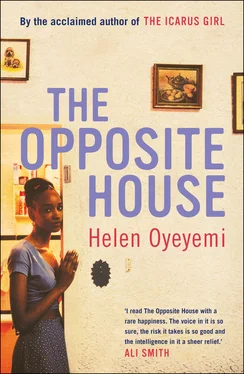Helen Oyeyemi - The Opposite House
Здесь есть возможность читать онлайн «Helen Oyeyemi - The Opposite House» весь текст электронной книги совершенно бесплатно (целиком полную версию без сокращений). В некоторых случаях можно слушать аудио, скачать через торрент в формате fb2 и присутствует краткое содержание. Год выпуска: 2008, Издательство: Bloomsbury UK, Жанр: Современная проза, на английском языке. Описание произведения, (предисловие) а так же отзывы посетителей доступны на портале библиотеки ЛибКат.
- Название:The Opposite House
- Автор:
- Издательство:Bloomsbury UK
- Жанр:
- Год:2008
- ISBN:нет данных
- Рейтинг книги:4 / 5. Голосов: 1
-
Избранное:Добавить в избранное
- Отзывы:
-
Ваша оценка:
- 80
- 1
- 2
- 3
- 4
- 5
The Opposite House: краткое содержание, описание и аннотация
Предлагаем к чтению аннотацию, описание, краткое содержание или предисловие (зависит от того, что написал сам автор книги «The Opposite House»). Если вы не нашли необходимую информацию о книге — напишите в комментариях, мы постараемся отыскать её.
The Opposite House — читать онлайн бесплатно полную книгу (весь текст) целиком
Ниже представлен текст книги, разбитый по страницам. Система сохранения места последней прочитанной страницы, позволяет с удобством читать онлайн бесплатно книгу «The Opposite House», без необходимости каждый раз заново искать на чём Вы остановились. Поставьте закладку, и сможете в любой момент перейти на страницу, на которой закончили чтение.
Интервал:
Закладка:
Carmen, you are born again, but you are born without your tongue. Find it. Be who you were before before .
But Elegua doesn’t go backwards, he makes things change when they need to. Chabella trusts what the German language has enabled her to call her spiritsoulmind; Chabella takes any risk that involves it. But if she should fail. . what poverty! The goal is that Carmen is not born again. The goal is that the lost tongue stays lost, but new tongues grow. No one need be maimed.
I am asleep when Aaron gets back, but he moves around and it wakes me. The dark is too thin. Aaron has the bedroom door wide open and all the lamps in the sitting room are on. His face keeps escaping the light, but I think he’s looking at me.
He says stiffly, ‘Maja. Do you not want this baby? Is the problem that you don’t want it?’
I sit up with a hand over my eyes. Aaron’s question has pushed him to me straight from washing up in the kitchen; his hands are still dripping soapy water and he is holding one of our soup bowls.
He says, ‘Just tell me.’
‘Why do you think I don’t want the baby?’
He says, ‘Just tell me, just say something about it.’
A tremor comes through his hands and he can’t hold the bowl any more, he bats it towards the ground as if he thinks it is a ball that will come back up to him. There is not much sound, but I flinch as the china shatters. Some of the pieces roll, then rest. Automatically he says, ‘Shit, sorry,’ and he bends to pick pieces up with his bare hands. Automatically, I say, ‘Use tissue, you’ll cut yourself.’
He does not listen. He balances a row of brittle blue claws on his palm before taking them away, coming back to rescue more. His hair is in his eyes. He does not get cut.
I say, ‘The leak. Please call the numbers, get a plumber here tomorrow. Call the numbers.’
Crouched on the carpet, Aaron tilts his head and says, ‘What numbers?’
I lie down again.
‘I left them on the pad.’
‘Those are numbers, eh? They look like a series of decimal points.’
I get up to rewrite the phone numbers so that he can see them, so that he can make the phone calls for me. But my note has already been ripped away from the pad.
I took a third-class degree. It was better than I’d expected, especially considering that I had handed in my dissertations on a block of wood. But I didn’t know how to tell my parents about my results. I had misled them from an early age: I had given them to understand that I was clever. And they were both first-class students.
So I completely lost my nerve.
‘It’s. . a 2:3,’ I said, when it was time to tell them.
Chabella, who had clasped her hands in anticipation of good news, lowered them again and frowned.
I didn’t back down, there was no point now. ‘A 2:3,’ I insisted.
Papi threw up his hands. ‘What in God’s name is a 2:3?’
‘You know,’ I quavered, holding my certificate behind my back. ‘You can get an upper second class, a middle second class, and a lower second class. A 2:1, a 2:2, a 2:3. .?’ Papi and Mami surrounded me, hugging me, kissing me, cackling.
‘So it’s a third-class degree, then,’ Chabella said.
Papi said, ‘Thank God — at least it’s finished. All the drama, all the crying, all the painting things black, the praying of the rosary instead of revising. A degree. You’ve got a degree, Maja Carmen Carrera! You passed! You are to some extent educated! And you didn’t even notice while it was happening!’
Amy Eleni was very flushed when she showed me her certificate. She had taken a first-class degree. I thought, Of course .
‘Please don’t give me any shit about this,’ she said, before I’d even opened my mouth.
When we got back to my house on graduation day, Amy Eleni, mortar board in hand, kicked off her high-heeled shoes and put them in her handbag so that the black toes peeped out of the top.
Our parents were in the back garden drinking Pimm’s and lemonade; Amy Eleni’s mother looked vaguely astonished by the drink in her glass. I told them we were going to church, and Chabella beamed. Amy Eleni’s father looked at us, his eyes that special shade of blue that Amy called ‘accusing ultramarine’, and was entirely unable to hide his pride. We almost changed our minds about going to church.
When we got out onto the street, Amy Eleni walked beside me barefoot, gowned, her hair in her eyes — people around us kept looking for cameras, as if we were on a photo shoot. We stared at the people who stared at us, caught them in our double headlights, stared with the conviction of newly educated, non-crap-taking female youth — they always looked away first.
The church ceiling seemed higher because of the incense, grey arms uplifted to exalt. Except for Father Gerald at the front, who sat with his eyes closed and his hands folded over a missal on his lap, the church was empty. He didn’t turn round. We had had our baptisms, our Holy Communions, our confirmations here. This church, from window to window, from wall to wall, seemed tied in for me with a desperate battle to avoid the Spirit — to be holy, but not yet.
For my confirmation name I had struggled to find the saint that God might love the least. The list was whittled down according to time and manner of the saint’s death — early, gory deaths were sure signs of excessive favour — stigmatic-yes-or-no, mystic-yes-or-no and whether or not that saint’s corpse had been exhumed and found to be uncorrupted. I wanted God to know the situation: I wanted to be more than just good friends, but nothing heavy until I was ready. I settled for being St Ignatius Loyola’s namesake, and suffered a few weeks of hearty laughter and being addressed as ‘Sister Ignatia’ by everyone in our confirmation class.
Amy Eleni chose Sophia and debated extending her given name to ‘Amy Eleni Sophia’. Her mother let her be confirmed in pearls, a black veil and a black, watered-silk dress with a stiff bustle. People in my class sniggered at her overdressing. But nobody knew what a victory that confirmation was for Amy Eleni. Her mother didn’t attend the Mass.
Now, Amy Eleni bent over the wooden prayer box, the box into which parishioners who wanted Father Gerard to pray for them had slipped their requests. She tucked it under her arm and walked out noiselessly, leaving me to tiptoe out as best and as quickly as I could.
‘I don’t know what to do next,’ she panted, when I caught up with her and cried outrage. ‘The stuff of life to knit me blew hither, here am I, right? From Cyprus à la my mother to England and school and university, there’s been a conspiracy of me, a me trying to work into a pattern. Now I feel like I’m out, graduated, so. . what? I don’t know which way I want to go yet, but I need to know if I’ll be allowed to get there. I don’t know if I can. . yuck. I suppose I want to know if I can trust people with my dreams.’
It wasn’t an explanation, but coming from Amy Eleni, it was enough. We opened the box in my bedroom, tipped out a cascade of white paper slips, and read aloud to each other prayer after prayer, request after request, until we ran to the end of them. Speaking the words, I felt as if we were unsealing the wants behind them, releasing spurts of chalky tomb air with every sound. I felt as if we were granting wishes because we heard them and then they were free to be possible, the way a priest sits in a box and listens and becomes Jesus.
The sun went down and left its rays clinging to our skin. I looked out of the window and saw that our parents were still in the garden, laughing and talking and blowing dandelion petals, oblivious beneath a dark orange sky that threatened to swallow them.
It seemed like everyone in our church was praying for each other. There were so many wishes that people not be hurt, so many offerings of thanks for others, so many short pleas to save lives or offer a new grace to die with. Amy Eleni looked dizzy and small with all these slips in her hands; she had not expected this.
Читать дальшеИнтервал:
Закладка:
Похожие книги на «The Opposite House»
Представляем Вашему вниманию похожие книги на «The Opposite House» списком для выбора. Мы отобрали схожую по названию и смыслу литературу в надежде предоставить читателям больше вариантов отыскать новые, интересные, ещё непрочитанные произведения.
Обсуждение, отзывы о книге «The Opposite House» и просто собственные мнения читателей. Оставьте ваши комментарии, напишите, что Вы думаете о произведении, его смысле или главных героях. Укажите что конкретно понравилось, а что нет, и почему Вы так считаете.












